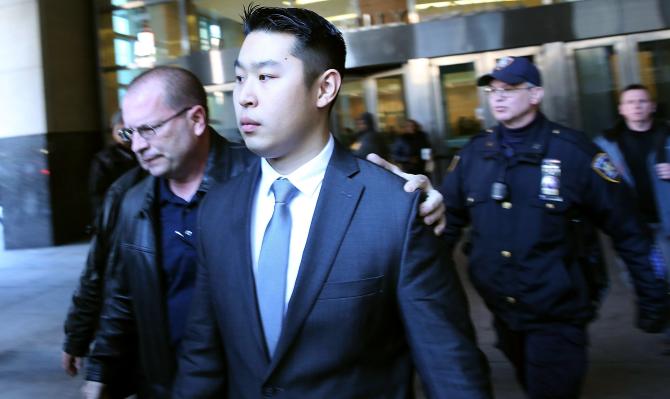[ad_1]

Peter Liang is escorted out of court on Feb. 11, 2015, in the Brooklyn borough of New York City. The former New York City officer was sentenced to probation and community service in the 2014 death of Akai Gurley.
Spencer Platt/Getty Images
Peter Liang, the former New York City police officer who was convicted of manslaughter in the 2014 shooting death of Akai Gurley, was sentenced Tuesday to five years’ probation and 800 hours of community service, according to the New York Post.
The judge in the case, Brooklyn Supreme Court Justice Danny Chun, also reduced the charges against the former rookie cop from manslaughter to criminally negligent homicide. Under the manslaughter conviction, Liang could have received up to 15 years in prison. Instead, he’ll do no jail time.
“I find incarceration to be unnecessary,” Chun said, according to the Post. “But instead of sitting at home, I think he will be much more productive if he spends more time in community service.”
Brooklyn District Attorney Kenneth Thompson had asked the judge last month not to give any jail time to Liang, who was convicted in February, stating that the case has “always been about justice and not about revenge.”
Gurley’s family was angered by Thompson’s recommendation, and after Judge Chun announced the sentence Tuesday, they expressed their frustration with the light sentence.
“No justice for Akai Gurley!” yelled Gurley’s aunt, Hertencia Petersen, as she left the court, according to the Post.
“Akai Gurley’s life doesn’t matter, black lives don’t matter. But justice will be served one way or another,” she said.
Liang’s lawyers had always maintained that the then-police officer accidentally shot the 28-year-old Gurley, who died when a bullet ricocheted off a wall when Liang fired his gun in a dark stairwell inside a Brooklyn public-housing complex in November 2014.
Read more at the New York Post.
[ad_2]




















